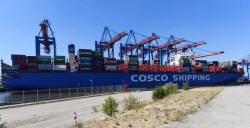Chinese exports accelerate even as Trump escalates trade
war
 Send a link to a friend
Send a link to a friend
 [August 08, 2018]
By Elias Glenn and Ben Blanchard [August 08, 2018]
By Elias Glenn and Ben Blanchard
BEIJING (Reuters) - China's exports surged
more than expected in July despite U.S. duties and its closely watched
surplus with the United States remained near record highs, as the
world's two major economic powers ramped up a bitter dispute that some
fear could derail global growth.
In the latest move by President Donald Trump to put pressure on Beijing
to negotiate trade concessions, Washington is set to begin collecting 25
percent tariffs on another $16 billion in Chinese goods on Aug. 23.
Wednesday's Chinese data provide the first readings of the overall trade
picture for the world's second-largest economy since U.S duties on $34
billion of Chinese imports came into effect on July 6.

All the same, China's exports for July rose a bigger than expected 12.2
percent year-on-year, showing little tariff impact for now and beating
June's 11.2 percent rise and analysts expectations in a Reuters poll for
10 percent growth.
Of more direct consequence in the Sino-U.S. trade war, China's surplus
with the United States shrank only marginally to $28.09 billion last
month from a record $28.97 billion in June. Washington has long
criticized China's trade surplus with the United States and has demanded
Beijing cut it.
[to top of second column] |

Chinese container ship "Cosco Shipping Aries" is unloaded at a
loading terminal in the port of Hamburg Germany July 27, 2018.
REUTERS/Fabian Bimmer/File Photo

Those demands could get even more strident if the yuan's sharp drop in recent
months raises the ire of the United States, which has in the past repeatedly
criticized Beijing for manipulating its currency to gain an unfair trade
advantage.
Economists say China appears to be taking a more hands-off approach to the yuan,
which marked its worst 4-month fall on record between April and July and has
provided some reprieve for exporters in the face of the rising trade tensions.
ANZ senior China economist Betty Wang said Beijing will likely resist using its
closely managed currency as a tool in the trade war.
"Currency devaluation, which may have helped exports to some extent, has been
largely market-driven in our view and is not a preferred policy tool by Chinese
policy makers as part of the retaliation measures," Wang said.
[© 2018 Thomson Reuters. All rights
reserved.] Copyright 2018 Reuters. All rights reserved. This material may not be published,
broadcast, rewritten or redistributed.
Thompson Reuters is solely responsible for this content.
 |